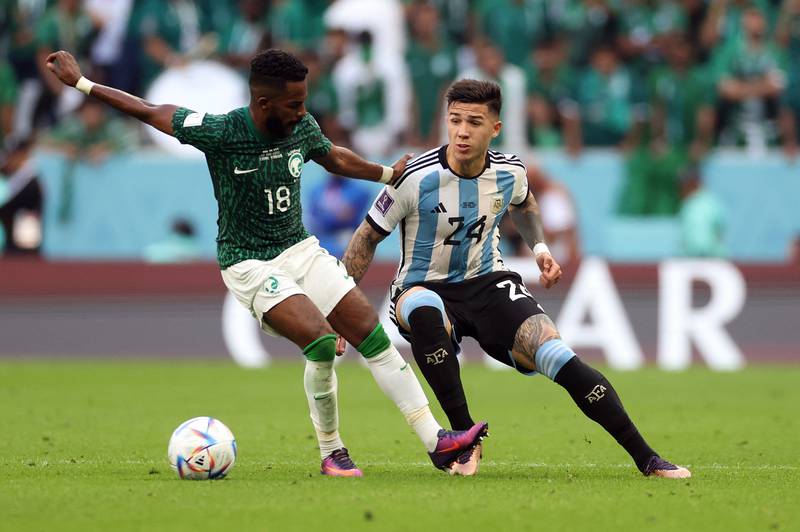Saudis' seismic shock and why all the injury time? World Cup day three talking points

Matchday three of the 2022 World Cup delivered arguably the greatest shock in tournament history.
Saudis' seismic shock
USA usurp England in 1950, Cameroon conquer Argentina in 1990 and Senegal slay France in 2002.
On Tuesday, Saudi Arabia added their name to the list of biggest World Cup upsets when they pulled off a thrilling 2-1 smash-and-grab victory against tournament favourites Argentina.
The Saudis trailed to a first-half Lionel Messi penalty and were thankful to see three more Argentina goals ruled out for offside - but make no mistake, Herve Renard's team were well worth their "totally crazy" win at the Lusail Stadium.Read More : Enner Valencia spoils the party as Ecuador win World Cup opener against Qatar The names of Saleh Al Shehri and Salem Al Dawsari will long be remembered for their goals against a team on an unbeaten 36-match run, but the Herculean efforts of the rest of the team - most notably Hassan Al Tambakti - should also be lauded.
While citizens of Saudi Arabia will enjoy a public holiday in recognition of the team's efforts in Qatar, their victory will now go down in World Cup folklore.
Why all the injury time?
By the end of Saudi Arabia's famous win over Argentina - only the fifth match of a 64-match tournament - almost 90 minutes of injury time had been added on for all games played to the point in Doha.
More than 14 minutes were added on to the first half of England's Group B opener to allow Iranian goalkeeper Alireza Beiranvand to receive treatment following a clash of heads with his own player.
And while we all agree that concussion protocols will take as long as necessary, it became obvious to anyone watching Beiranvand would be in no fit state to continue in less than half that time.
Reasons the game is halted include injuries, video assistant referee (VAR) decisions, substitutions, penalties and red cards, with some players often deliberately delaying the restart after such incidents in order to wind down the clock – an annoying theme already prevalent at this tournament.
Fourth officials have been instructed by Fifa to keep track of time lost during the games in Qatar. Depending on your viewpoint, this has caused unnecessarily long games (see England-Iran and Argentina-Saudi Arabia) or allowed for us to witness last-minute goals that only enhance the tournament (see Davy Klaassen's strike for the Netherlands on 98 minutes and 17 seconds against Senegal).
And what happens when we get to the knockout stage? An extra half-hour (15 minutes each half) is played if the scores are level at the end of 90 minutes. Teams could potentially be forced to play three halves (see Mehdi Taremi's penalty for Iran against England came with 102:30 on the clock, the latest World Cup goal on record excluding extra time) or more if the fourth official deems it appropriate.
The clock should stop, so to speak, to allow injured players to receive treatment, but the time added on to celebrate a goal can be mitigated by hurrying the players along and time wasters can be dealt with by being shown a yellow card for repeated infringements.
Saudis' seismic shock
USA usurp England in 1950, Cameroon conquer Argentina in 1990 and Senegal slay France in 2002.
On Tuesday, Saudi Arabia added their name to the list of biggest World Cup upsets when they pulled off a thrilling 2-1 smash-and-grab victory against tournament favourites Argentina.
The Saudis trailed to a first-half Lionel Messi penalty and were thankful to see three more Argentina goals ruled out for offside - but make no mistake, Herve Renard's team were well worth their "totally crazy" win at the Lusail Stadium.
While citizens of Saudi Arabia will enjoy a public holiday in recognition of the team's efforts in Qatar, their victory will now go down in World Cup folklore.
Why all the injury time?
By the end of Saudi Arabia's famous win over Argentina - only the fifth match of a 64-match tournament - almost 90 minutes of injury time had been added on for all games played to the point in Doha.
More than 14 minutes were added on to the first half of England's Group B opener to allow Iranian goalkeeper Alireza Beiranvand to receive treatment following a clash of heads with his own player.
And while we all agree that concussion protocols will take as long as necessary, it became obvious to anyone watching Beiranvand would be in no fit state to continue in less than half that time.
Reasons the game is halted include injuries, video assistant referee (VAR) decisions, substitutions, penalties and red cards, with some players often deliberately delaying the restart after such incidents in order to wind down the clock – an annoying theme already prevalent at this tournament.
Fourth officials have been instructed by Fifa to keep track of time lost during the games in Qatar. Depending on your viewpoint, this has caused unnecessarily long games (see England-Iran and Argentina-Saudi Arabia) or allowed for us to witness last-minute goals that only enhance the tournament (see Davy Klaassen's strike for the Netherlands on 98 minutes and 17 seconds against Senegal).
And what happens when we get to the knockout stage? An extra half-hour (15 minutes each half) is played if the scores are level at the end of 90 minutes. Teams could potentially be forced to play three halves (see Mehdi Taremi's penalty for Iran against England came with 102:30 on the clock, the latest World Cup goal on record excluding extra time) or more if the fourth official deems it appropriate.
The clock should stop, so to speak, to allow injured players to receive treatment, but the time added on to celebrate a goal can be mitigated by hurrying the players along and time wasters can be dealt with by being shown a yellow card for repeated infringements.
Source: www.thenationalnews.com
